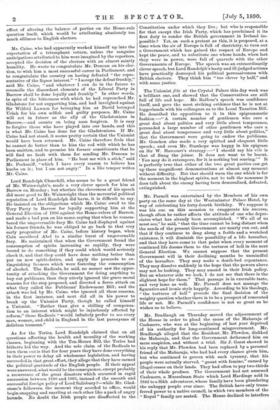The three-cornered duel in Barrow-in-Furness has resulted in the return
of the Gladstonian candidate, Mr. Duncan, by a narrow majority (132) over the Conservative, Mr. Wainwright, Mr. Caine being left at the bottom of the poll with only 1,280 votes, whereas Mr. Duncan polled 1,994 votes, and Mr. Wain- wright, 1,862. It is evident that Mr. Caine's supporters were abstracted from the Conservative, Liberal Unionist, and Glad- stonian vote, and that in addition some (probably of both the lalger parties) stayed away, as the total poll was smaller than that of either 1885 or the by-election in 1886, and only larg( r by 42 votes than that of the General Election of 1886, at which there were a great number of abstentions. Whether more who would have been Unionists had they not been Cainites, or who would have been Gladstonians had they not been Cainites, voted for Mr. Caine, it is impossible to say with certainty; but the figures look at least as if the former event had happened, unless the Temperance controversy has had the effect of altering the balance of parties on the Home-rule question itself, which would be attributing absolutely too much silliness to English electors.















































 Previous page
Previous page